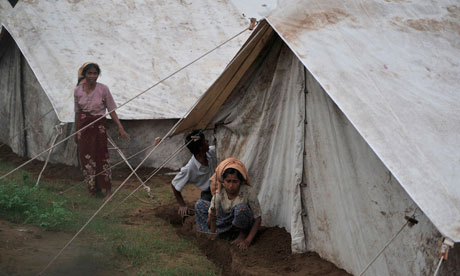 |
Foreign Affairs Minister John Baird has announced the opening of a Canadian embassy in Myanmar, also known as Burma.Photograph by: Postmedia News , Postmedia News |
OTTAWA — Canada's decision to open a new embassy in Myanmar comes amid significant democratic reforms — and an international rush for the Southeast Asian nation's natural resources.
Foreign Affairs Minister John Baird announced the new diplomatic mission on Friday, a day after the White House eased U.S. sanctions to allow American firms to invest there and work with its state-run oil and gas company.
U.S. businesses were reportedly worried they may miss out as other competitors, including China, India, Thailand, Malaysia and France, have already secured deals.
Foreign companies have also sought to cash in on Myanmar's massive mineral and gem resources, which are valued at billions of dollars.
Announcing the new embassy from Thailand, where he is in the midst of a two-week swing through Asia, Baird focused his comments on the progress that has been made by the ruling military junta to improve Myanmar's human rights and democratic record.
"There's been an incredible amount of reform in the country over the past 18 months," Baird said. "We're impressed by that reform."
Coming after decades of oppressive rule by the junta, those reforms have included opening up Myanmar's economy, releasing hundreds of political prisoners, legalizing protests and the holding of historic byelections.
Canada has never had an embassy in Myanmar, and the decision to create one is the latest step in Canada's re-engagement with the country.
Sanctions imposed against the country in the aftermath of a violent crackdown on pro-democracy protesters in 2007 were suspended in April.
Baird did not mention the economic opportunities that exist in Myanmar, but an official in his office confirmed that in addition to helping promote human rights and democracy, the new Canadian embassy "will work to support Canadian commercial interests and investment in Burma."
Asked why Canada was opening an embassy in Myanmar when it is closing diplomatic offices in the U.S. and planning $170 million in cuts to the Foreign Affairs department, spokesman Rick Roth said the Conservative government is "putting our resources where they need to be."
"The (Southeast Asian) region presents a tremendous opportunity," Roth added.
There have been concerns that in their rush to get at Myanmar's vast resources, Western nations have been too quick to welcome the country back into the fold and too willing to overlook the large number of political and human rights problems that continue to exist.
For example, foreign companies appear to be largely ignoring pro-democracy leader and Nobel Peace laureate Aung San Suu Kyi's calls for them not to work with Myanmar's state-run oil and gas company until it becomes more transparent.
Meanwhile, news reports indicated Friday that 10 United Nations and NGO workers had been arrested in the western part of the country where minority Rohingya Muslims are being rounded up in what some fear is a campaign of ethnic cleansing.
A week earlier, 20 student leaders were detained as they prepared to commemorate the 50th anniversary of a military attack on a university. They were later freed.
Baird himself acknowledged that much work remains to be done in Myanmar.
"Although the Burmese government has taken positive steps to improve human rights and democracy over the past year, we continue to urge more progress on reforms," he said.
"Obviously although they've taken some very positive steps, there's more progress required."
Tin Maung Htoo, executive director of the Canadian Friends of Burma, has no doubt the Conservative government's decision to open a new embassy in Myanmar is as much about business as it is about supporting the reforms going on there.
That isn't necessarily a bad thing, he said, given the need for economic development after decades of stagnation thanks to international isolation and the policies of the ruling junta.
"But to me, only focusing on natural resource areas is not wise," he said. "In Burma, there are many other areas where you can do business."
SOURCE: http://www.canada.com/news/Canada+opening+embassy+Burma/6929351/story.html
SOURCE: http://www.canada.com/news/Canada+opening+embassy+Burma/6929351/story.html








